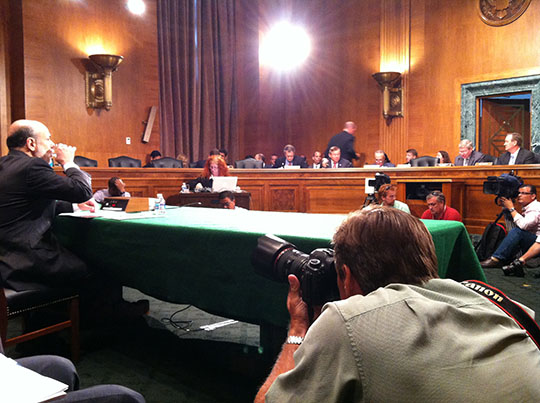
Federal Reserve Chairman Ben Bernanke delivers his semi-annual testimony to senators. Sonali Basak/MEDILL
WASHINGTON — Federal Reserve Chairman Ben Bernanke gave what may be his final testimony to senators Thursday, leaving behind more questions than conclusions about the Fed’s direction in monetary policy.
Senators questioned, rather than criticized, Bernanke’s current stimulus policy, called quantitative easing. It’s a process by which the central bank buys back government securities from banks to help flood money into the marketplace.
Bernanke’s testimony earlier in the week led to debate among lawmakers about how and when the quantitative easing program would end. Bernanke told a House committee Wednesday that the program would scale back if economic conditions improve at a faster and more sustainable rate.
House members pushed for more specificity on what favorable economic conditions would amount to.
But Thursday, senators asked not what Bernanke could do for Congress, but what Congress could do for the Federal Reserve. They spent less time questioning quantitative easing, and more time asking what Congress and the Fed could do together to better regulate the financial system at large.
Concerned that the “hyperactivity of the Fed” was “acting as an enabler” for congressional inaction, Tennessee Republican Sen. Bob Corker asked how Congress could better provide support for the economy rather than hiding behind the Fed and expecting it to manage the financial system single-handedly.
Bernanke said Congress should create consistent frameworks for monitoring the financial system and a means to effectively respond to financial crisis. “What we learned is that we didn’t have the right tools,” Bernanke said.
Congress and Federal Reserve Board members have formulated a number of ways to raise capital requirements for banks as a way of managing risk of large financial institutions without risking drying up credit for consumers.
The more collaborative tone at the Senate hearing comes after a heated conversation at the House Financial Services Committee on Wednesday, when Rep. Jeb Hensarling, R-Texas, expressed his disapproval of the Fed’s current monetary policy.
“The Federal Reserve has regrettably, in many ways, enabled this failed economic policy through a program of risky and unprecedented asset purchases that has swollen its balance sheet to more than $3 trillion,” Hensarling said. Some congressmen believed that the Fed carried out too much of a hands-on approach.
But when House members pointed fingers at Bernanke, Bernanke pointed right back, testifying that risks in the current economy may be due in part to uncertainty on Capitol Hill surrounding fiscal policy and the status of the nation’s debt-ceiling.
On the other hand, Sen. Mike Crapo, R-Idaho, the ranking member of the Senate Committee on Banking, Housing and Urban Affairs, did not question the legitimacy of the Fed’s policy. Rather, he asked, “Why does the Fed see the need for such an accommodative policy to continue into the future?”
Though the Fed wants to see substantial improvements in the economy, “substantial is in the eye of the beholder,” Crapo said, adding that more specificity may assuage lawmakers and market makers.
The quantitative easing program was expected to start scaling back in September, but Bernanke said it might take more time if the Fed cannot determine that the economy is strong enough to stand on its own.
Thursday may have marked his final testimony on Capitol Hill, Congress, since his term as chairman is up in January.
Many political leaders thanked Bernanke for his endurance in the face of the financial crisis, but as the economy gradually rebounds, congressmen hope for a speedier recovery – and they all have opinions as to how this should be accomplished.
